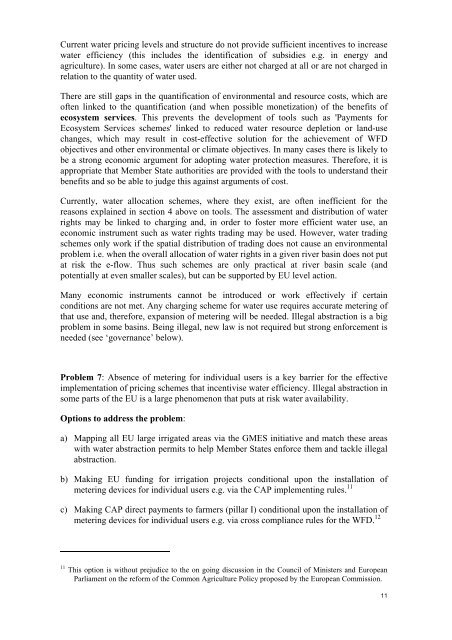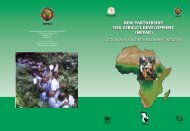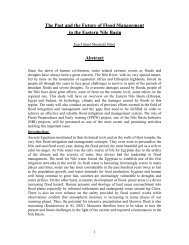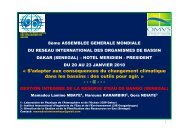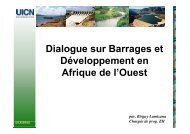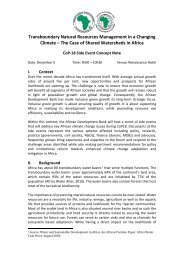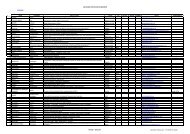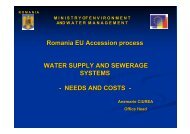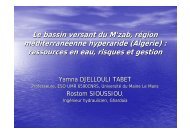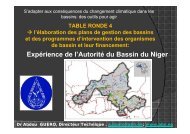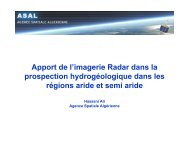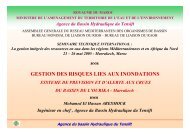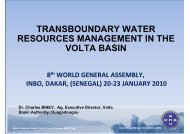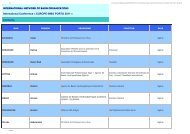background consultation document - European Commission - Europa
background consultation document - European Commission - Europa
background consultation document - European Commission - Europa
Create successful ePaper yourself
Turn your PDF publications into a flip-book with our unique Google optimized e-Paper software.
Current water pricing levels and structure do not provide sufficient incentives to increase<br />
water efficiency (this includes the identification of subsidies e.g. in energy and<br />
agriculture). In some cases, water users are either not charged at all or are not charged in<br />
relation to the quantity of water used.<br />
There are still gaps in the quantification of environmental and resource costs, which are<br />
often linked to the quantification (and when possible monetization) of the benefits of<br />
ecosystem services. This prevents the development of tools such as 'Payments for<br />
Ecosystem Services schemes' linked to reduced water resource depletion or land-use<br />
changes, which may result in cost-effective solution for the achievement of WFD<br />
objectives and other environmental or climate objectives. In many cases there is likely to<br />
be a strong economic argument for adopting water protection measures. Therefore, it is<br />
appropriate that Member State authorities are provided with the tools to understand their<br />
benefits and so be able to judge this against arguments of cost.<br />
Currently, water allocation schemes, where they exist, are often inefficient for the<br />
reasons explained in section 4 above on tools. The assessment and distribution of water<br />
rights may be linked to charging and, in order to foster more efficient water use, an<br />
economic instrument such as water rights trading may be used. However, water trading<br />
schemes only work if the spatial distribution of trading does not cause an environmental<br />
problem i.e. when the overall allocation of water rights in a given river basin does not put<br />
at risk the e-flow. Thus such schemes are only practical at river basin scale (and<br />
potentially at even smaller scales), but can be supported by EU level action.<br />
Many economic instruments cannot be introduced or work effectively if certain<br />
conditions are not met. Any charging scheme for water use requires accurate metering of<br />
that use and, therefore, expansion of metering will be needed. Illegal abstraction is a big<br />
problem in some basins. Being illegal, new law is not required but strong enforcement is<br />
needed (see ‘governance’ below).<br />
Problem 7: Absence of metering for individual users is a key barrier for the effective<br />
implementation of pricing schemes that incentivise water efficiency. Illegal abstraction in<br />
some parts of the EU is a large phenomenon that puts at risk water availability.<br />
Options to address the problem:<br />
a) Mapping all EU large irrigated areas via the GMES initiative and match these areas<br />
with water abstraction permits to help Member States enforce them and tackle illegal<br />
abstraction.<br />
b) Making EU funding for irrigation projects conditional upon the installation of<br />
metering devices for individual users e.g. via the CAP implementing rules. 11<br />
c) Making CAP direct payments to farmers (pillar I) conditional upon the installation of<br />
metering devices for individual users e.g. via cross compliance rules for the WFD. 12<br />
11 This option is without prejudice to the on going discussion in the Council of Ministers and <strong>European</strong><br />
Parliament on the reform of the Common Agriculture Policy proposed by the <strong>European</strong> <strong>Commission</strong>.<br />
11


